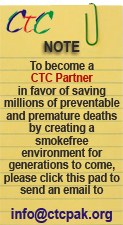ISLAMABAD, Pakistan
—The World Health Organization (WHO)
today released a landmark report
that makes clear both the
devastating scope of the global
tobacco epidemic – it is the leading
cause of preventable death in the
world today – and the fact that it
is entirely avoidable if nations
implement proven solutions. This
report presents the first
comprehensive picture of what the
world’s nations are doing to address
this public health crisis, and it
demonstrates starkly that most
nations are not doing nearly
enough. Only about five percent of
the world’s population is covered by
any one of the key interventions
recommended by the WHO.
There are about 22 million smokers
in the country and 55% of the
households have at least one
individual who smokes tobacco. As a
result Pakistan accounts for a
sizeable proportion of the
cigarettes consumed in South Asia.
Observations
were made at different public
places; including restaurants,
offices, banks, public transport
vehicles, commercial areas,
cigarette selling outlets and
educational institutions in major
cities of Pakistan.
Compliance to the tobacco laws was
found to be the highest in banks,
followed by offices, while the most
violations were observed in public
service vehicles.
The WHO Report on the Global
Tobacco Epidemic, 2008, finds
that tobacco use already kills 5.4
million people a year and the
epidemic is worsening, especially in
the developing world where more than
80 percent of tobacco-caused deaths
will occur in the coming decades.
Unless urgent action is taken, one
billion people will die worldwide
from tobacco use this century.
“We have taken important steps
forward in protecting the health of
our citizens, but we know we must
act now to do more,” said Khurram
Hashmi, the coordinator of Coalition
for Tobacco Control in Pakistan.
“This important report gives us the
roadmap we can use to reverse the
tobacco epidemic and save lives.”
The Coalition for Tobacco Control -
Pakistan (CTC-Pak) has been
advocating for stronger measures for
tobacco control by adaptation of
FCTC provisions into national
tobacco control laws and is
currently working for the
implementation of the tobacco
control statutes in Pakistan
encompassing mainly smoking at
public places and underage selling
while advocating for the development
of those not addressed in the
national tobacco control laws for
example raise in taxation of tobacco
products, pictorial warnings on
tobacco packs and other supply side
measures defined under FCTC.
The good news is that this epidemic
is far from inevitable, and we know
how to stop it. Based on science and
experience, the WHO has identified
six cost-effective solutions –
called MPOWER in the report – that
have been proven to reduce tobacco
use:
1-
Monitor
tobacco use and assess the impact of
tobacco prevention and cessation
efforts;
2-
Protect
everyone from secondhand smoke with
laws that require smoke-free
workplaces and public places;
3-
Offer
help to every tobacco user to quit;
4-
Warn
and effectively educate every person
about the dangers of tobacco use
with strong, pictorial health
warnings and hard-hitting, sustained
media campaigns to educate the
public;
5-
Enact
and enforce comprehensive bans on
tobacco advertising, promotion and
sponsorships and on the use of
misleading terms such as “light” and
“low-tar;” and
6-
Raise
the price of tobacco products by
increasing tobacco taxes.
All of the report’s recommended
measures are scientifically proven,
highly cost-effective policies that
are part of
the Framework Convention on Tobacco
Control (FCTC), the international
tobacco control treaty that became
international law in 2005. To date,
152 nations have ratified the
treaty, but
WHO finds that only five percent of
the world’s population lives in a
country that has adopted at least
one of these anti-tobacco
strategies. Pakistan has ratified
the treaty.
“These are scientifically proven
policies that can reverse the
tobacco epidemic around the globe,”
said Khurram Hashmi. “The tobacco
epidemic is shifting to the
developing world – due not only to
population growth – but to the
tobacco industry’s aggressively
targeted marketing and promotion
tactics.”
“The global tobacco epidemic does
not just affect the health of
millions of people in Pakistan – it
is also an economic threat that
costs local and national economies
billions of dollars each year,” said
Khurram Hashmi.
Tobacco use disproportionately hurts
the poor and deepens poverty by
siphoning money needed for basic
necessities such as food, shelter
and education and killing wage
earners in the prime of their lives.
While there is much work to be done,
support for global tobacco control
policies is gaining momentum. Just
this year, a growing number of
countries have implemented strong
smoke-free laws, including France,
Turkey and Thailand. And several
countries, including Brazil,
Thailand, Belgium, Australia and
Canada have increased public
awareness of the dangers of smoking
by enhancing pictorial warnings on
the packaging of tobacco products to
increase smokers’ awareness of their
risk.




